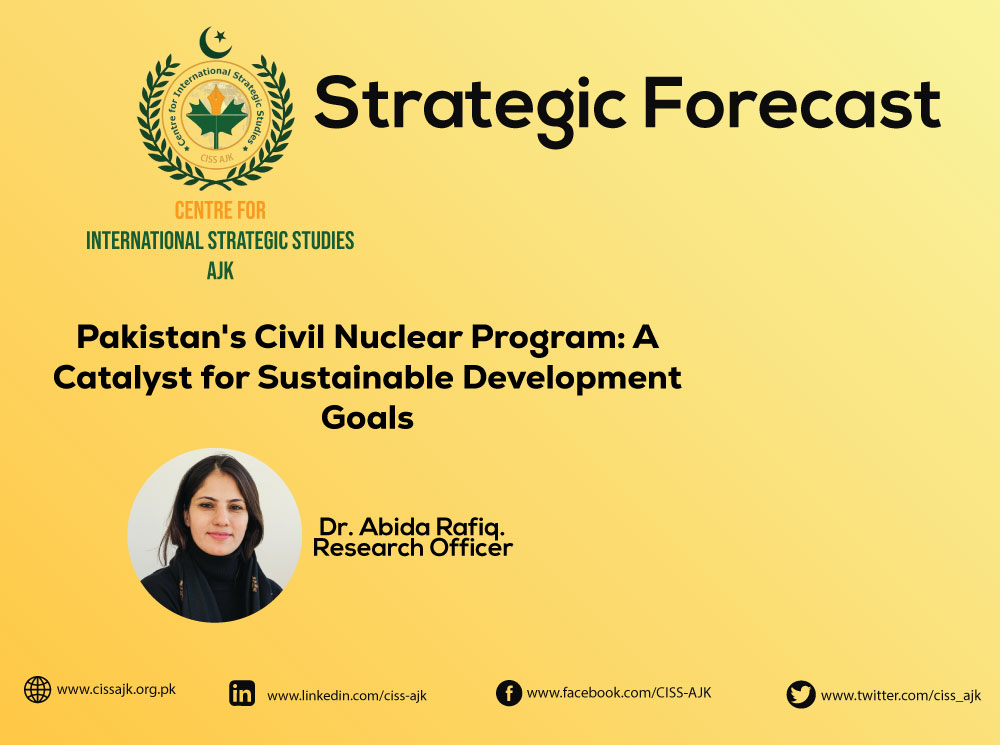Introduction: Pakistan’s civil nuclear program has been a topic of global interest, both for its strategic implications and its potential to contribute to sustainable development. This article aims to explore the relevance of Pakistan’s civil nuclear use in achieving various Sustainable Development Goals (SDGs), including Goal 2 (Zero Hunger), Goal 9 (Industry, Innovation, and Infrastructure), Goal 13 (Climate Action), Goal 7 (Affordable and Clean Energy), Goal 16 (Peace, Justice, and Strong Institutions), and Goal 3 (Good Health and Well-being). By analyzing the multifaceted aspects of Pakistan’s nuclear program, we can better understand its positive impact on sustainable development.
Relevance with, Pakistan’s civil nuclear program contributes to Goal 2 by enabling agricultural advancements through the use of nuclear techniques. Nuclear technologies, such as radiation-induced mutation breeding and isotopic applications, enhance crop productivity, disease resistance, and food preservation. Through initiatives like the Pakistan Agriculture Research Council (PARC), the country has successfully utilized nuclear techniques to improve crop yields, address food security challenges, and ultimately alleviate hunger.
It also plays a pivotal role in fostering industry, innovation, and infrastructure. The program has facilitated the development of nuclear power plants, such as Chashma Nuclear Power Plant and Karachi Nuclear Power Complex, which provide a stable and reliable source of electricity for industries, homes, and infrastructure projects. Nuclear energy contributes to reducing dependence on fossil fuels and ensures a sustainable and uninterrupted power supply, supporting industrial growth, technological innovation, and the development of critical infrastructure.
Pakistan’s civil nuclear program significantly contributes to mitigating climate change and achieving Goal 13. Nuclear power generation produces negligible greenhouse gas emissions, providing a low-carbon alternative to fossil fuel-based energy sources. By diversifying its energy mix with nuclear power, Pakistan reduces its carbon footprint, decreases air pollution, and contributes to global efforts to combat climate change. Furthermore, Pakistan has actively engaged in international collaborations and adopted stringent safety measures to ensure the safe and secure operation of its nuclear facilities.
Access to affordable and clean energy is crucial for sustainable development, and Pakistan’s civil nuclear program contributes significantly to Goal 7. As, nuclear energy provides a cost-effective source of electricity, offering long-term price stability compared to fossil fuel-based alternatives. By reducing its reliance on imported fossil fuels, Pakistan can achieve energy security and affordability, promoting economic growth and improving the living standards of its population. Nuclear power also helps bridge the energy demand-supply gap, particularly in remote areas where grid connectivity is limited.
Furthermore, Pakistan’s commitment to peaceful and responsible use of nuclear technology aligns with Goal 16. The country has demonstrated its adherence to international non-proliferation norms and has actively participated in global nuclear security initiatives. By establishing robust institutions and frameworks, such as the Pakistan Nuclear Regulatory Authority (PNRA), Pakistan ensures the safe and secure use of nuclear energy, preventing the proliferation of nuclear weapons, and promoting regional stability and peace.
Not only has this Pakistan’s civil nuclear program contributed to Goal 3 through its application in healthcare and medical research. Nuclear medicine techniques, such as radiotherapy and radiopharmaceuticals, play a vital role in diagnosing and treating various diseases, including cancer. Nuclear medicine facilities, such as the Pakistan Institute of Nuclear Science and Technology (PINSTECH), provide essential medical services, improving access to quality healthcare and contributing to the well-being of the population.
Pakistan’s civil nuclear program has long been a subject of international attention and debate. As a developing nation, Pakistan has been utilizing nuclear energy for peaceful purposes, aiming to meet its growing energy demands, enhance socio-economic development, and contribute to the United Nations’ Sustainable Development Goals (SDGs).

